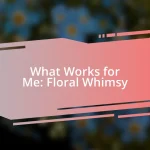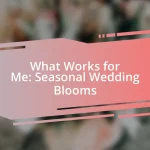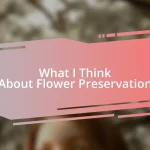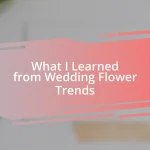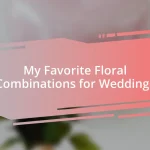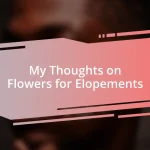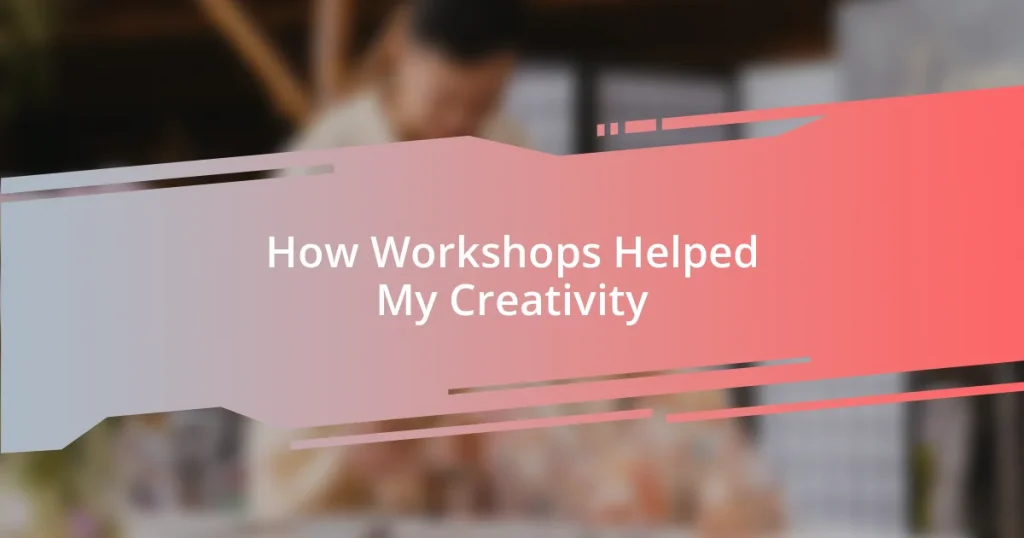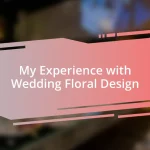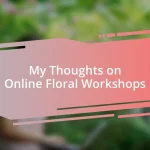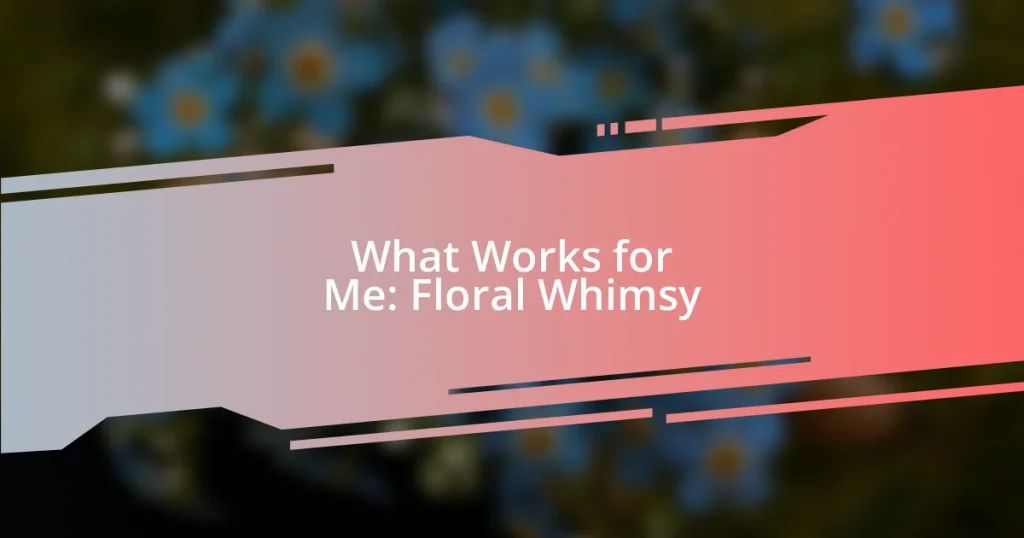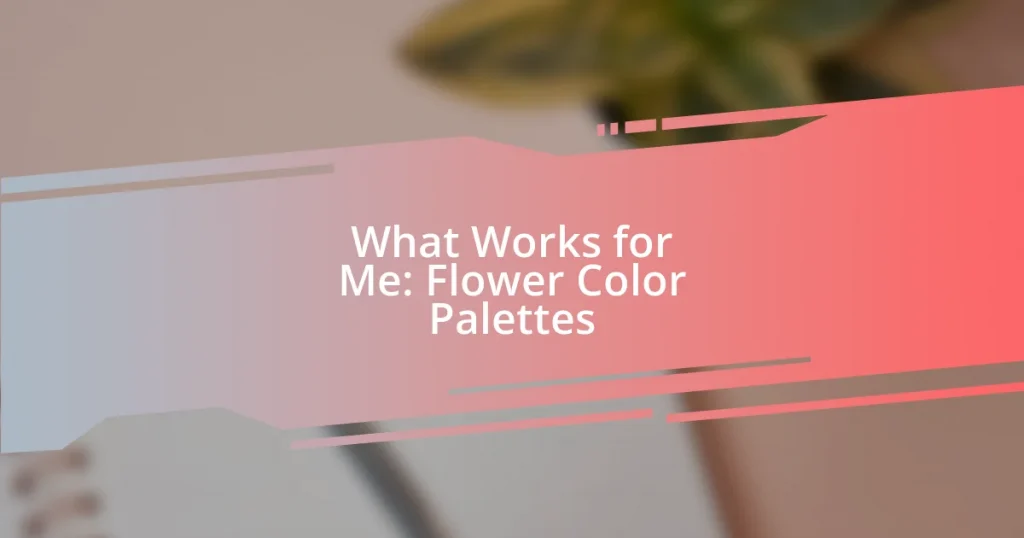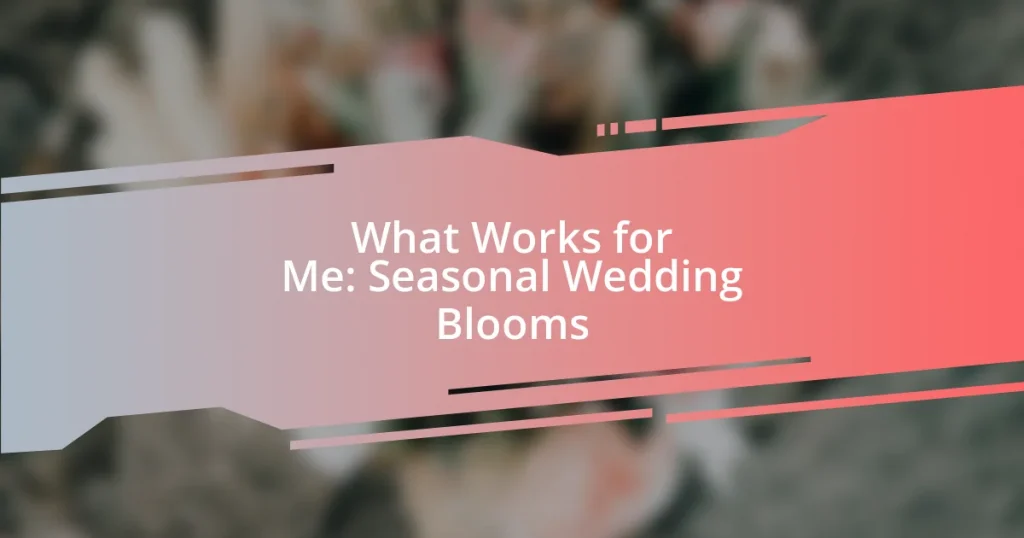Key takeaways:
- Creativity is essential for problem-solving and emotional expression, and can be cultivated through engaging in workshops.
- Collaborative environments in workshops foster diverse ideas and trust, enabling participants to share and develop their creativity more effectively.
- Active participation and a curious mindset during workshops enhance individual creativity and can lead to valuable connections for ongoing inspiration.
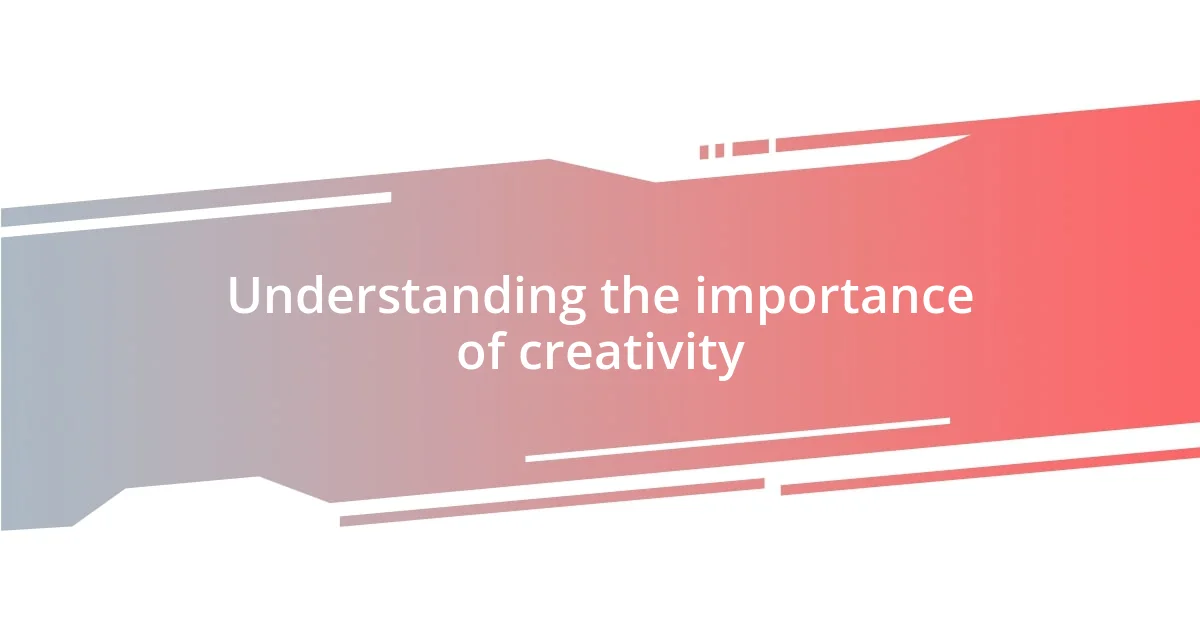
Understanding the importance of creativity
Creativity is more than just a tool; it’s a vital part of what makes us human. I remember sitting in my first workshop, feeling nervous yet excited. As we began brainstorming ideas, I noticed how freely my thoughts flowed. It struck me then that creativity isn’t just about artistic talent; it’s about problem-solving and thinking outside the box. How often do we limit ourselves by believing we can’t be creative?
When I reflect on my own experiences, it’s clear that embracing creativity leads to innovation in all areas of life. One workshop offered an exercise where we had to describe an everyday object in five different ways. That challenge opened my eyes to the idea that creativity can transform the mundane into something exciting. What if we applied that same mindset to our daily tasks?
Ultimately, creativity fuels emotional expression and connection. I’ve found that sharing my creative outputs with others fosters community and dialogue. Have you ever felt a rush of joy when someone resonates with your ideas? There’s something magical about that exchange. Engaging in creative pursuits reminds us that we’re not alone in our thoughts and feelings, which is incredibly powerful.
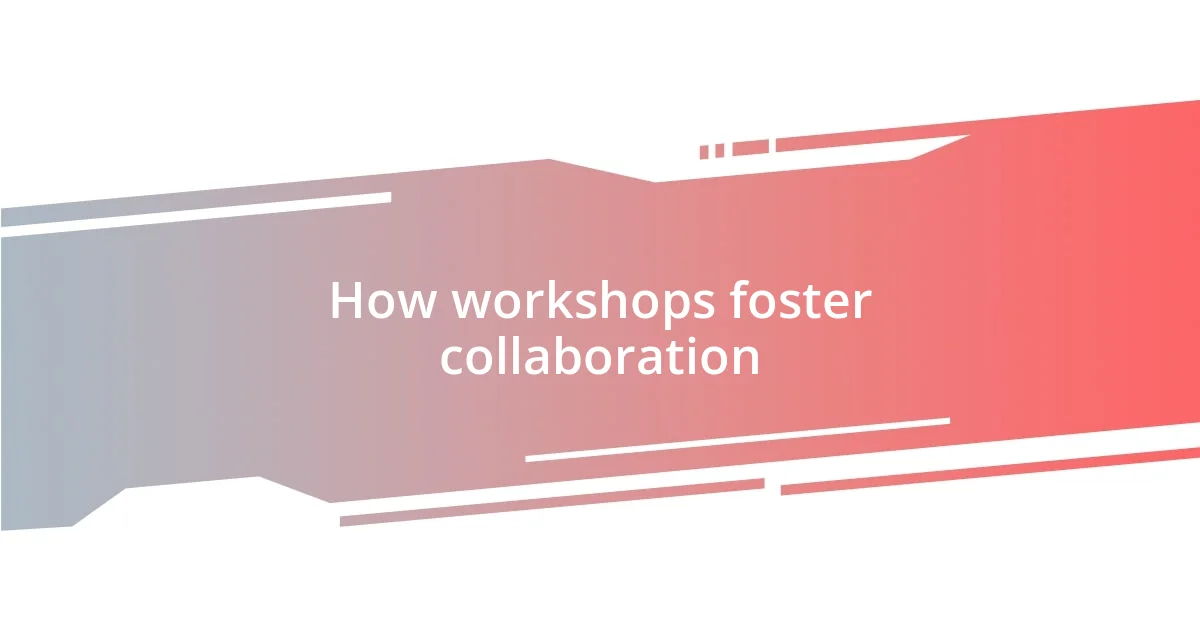
How workshops foster collaboration
Workshops create a unique environment for collaboration that sparks new ideas. I recall a specific session where we had to work in pairs, sharing our thoughts on a common theme. The dynamic was electric—seeing how my partner interpreted an idea differently broadened my perspective. It’s incredible how bouncing ideas off another person can ignite creativity that you might not have stumbled upon alone.
The diverse range of participants also plays a crucial role in fostering collaboration. In one workshop, I found myself among people from various backgrounds—graphic designers, writers, and engineers. Each person brought their unique lens on the task at hand. I felt invigorated as we discussed different approaches, leading to revelations that were impossible without that collaborative spirit. This exchange of ideas truly showcased how teamwork can amplify individual creativity, revealing the value of shared experiences.
Often, it’s not just the collaboration itself that inspires creativity but the trust and safety that workshops cultivate. I remember a moment of vulnerability when I shared a half-baked idea that I was unsure about. Instead of judgment, I received encouragement and constructive feedback. That sense of support made me more inclined to share my thoughts, enriching the group’s creativity. This environment where ideas can flow freely allows for genuine collaboration to take center stage, transforming creative potential into tangible outcomes.
| Aspect | Impact on Collaboration |
|---|---|
| Environment | Encourages open sharing and idea exchange |
| Diversity of Participants | Brings varied perspectives leading to innovative ideas |
| Supportive Atmosphere | Fosters trust, making participants comfortable with vulnerability |
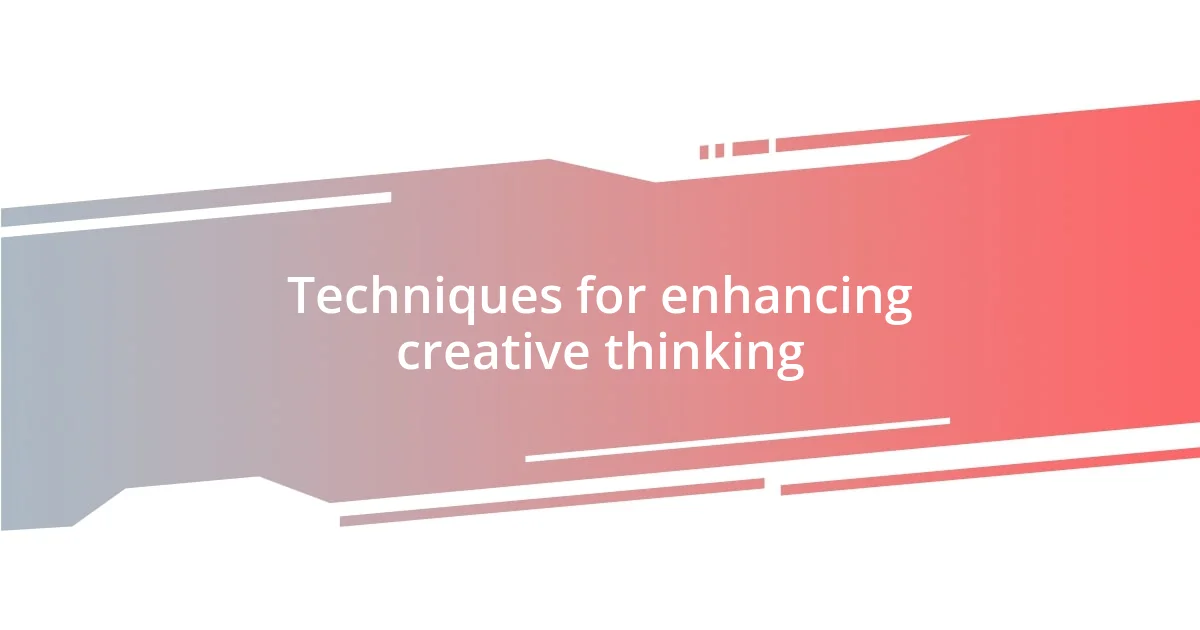
Techniques for enhancing creative thinking
One technique that has profoundly influenced my creative thinking is the concept of “mind mapping.” During one workshop, we were encouraged to visualize our ideas on paper, connecting them with lines and branches. This method helped me see relationships between different thoughts that I would have otherwise overlooked. It’s fascinating how visually organizing chaos can lead to clarity and spark new concepts.
Here are some techniques that can enhance creative thinking:
- Brainstorming Sessions: Gather in groups and explore as many ideas as possible, no matter how wild they seem. I recall a session where we threw around absurd ideas, and surprisingly, some led to groundbreaking concepts.
- Reverse Thinking: Instead of asking how to solve a problem, think of ways to create the problem. This shift in perspective can unlock unexpected solutions. I applied this during a design challenge and found innovative angles I hadn’t considered before.
- Timed Challenges: Set a timer and generate ideas within that constraint. The pressure can sometimes lead to the most spontaneous and creative thoughts. I often do this when I feel stuck, and it brings out a rush of new ideas I never thought I had.
- Doodling and Sketching: Allowing your hand to move freely can unleash creativity. I often bring a sketchbook to workshops and find that drawing simple shapes while listening can generate unexpected ideas.
- Collaborative Storytelling: Building a story collectively pushes everyone to think on their feet. I participated in a round-robin storytelling exercise that spiraled into such a bizarre yet wonderful narrative that it sparked so many creative avenues for me.
These techniques have undeniably reshaped my creative approach, turning what once felt like an uphill battle into an adventurous journey filled with possibilities.
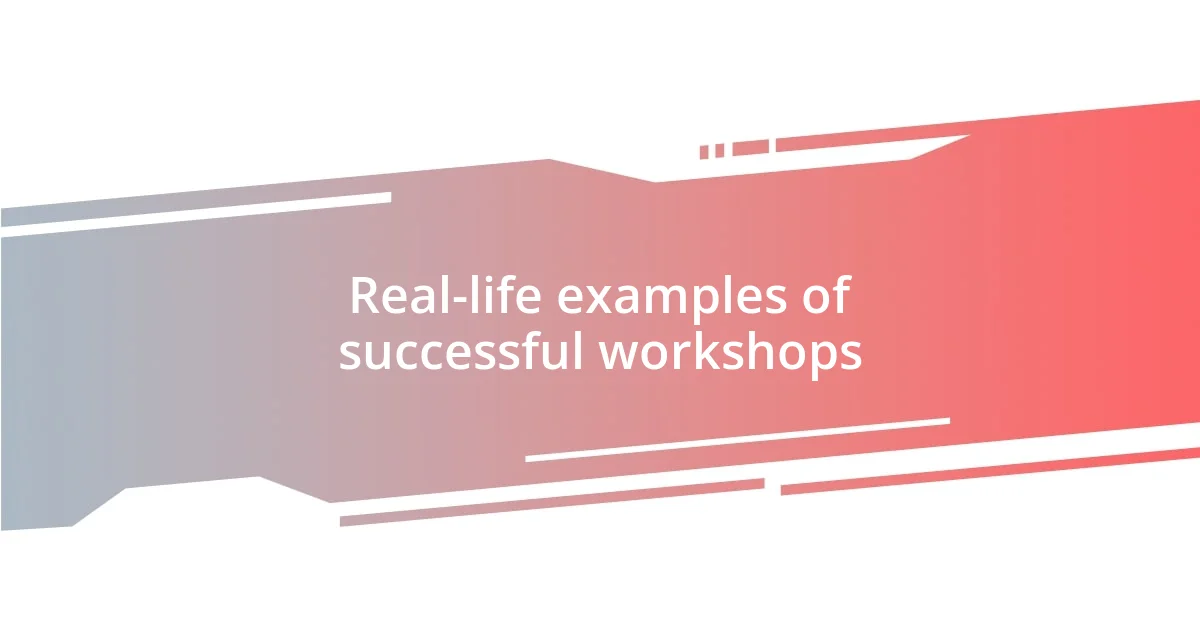
Real-life examples of successful workshops
During a recent creativity workshop, I experienced firsthand how hands-on activities can lead to meaningful breakthroughs. We were split into groups and asked to create a pitch for a fictional product using only recycled materials. The room buzzed with excitement as we transformed everyday items into innovative prototypes. Watching my team unleash their imagination left me in awe; it was a reminder of how resourcefulness can fuel creativity in unexpected ways.
Another standout example came when I attended an art workshop focused on mixed media. We were encouraged to paint over our own old works, creating something entirely new. This process of layering felt liberating, almost cathartic, as it allowed me to let go of past frustrations tied to my earlier pieces. I realized that, just like in life, we often build upon previous experiences to create fresh perspectives.
Have you ever wondered how a simple change in format can inspire creativity? I remember a workshop where we engaged in a “silent brainstorm.” Instead of verbal exchanges, we scribbled our ideas on sticky notes and placed them on a shared board. The absence of sounds turned the space into a reservoir of visual inspiration. It was intriguing to see how this technique encouraged me to pay attention to details and be more reflective, proving that quiet moments can be incredibly powerful in a creative process.
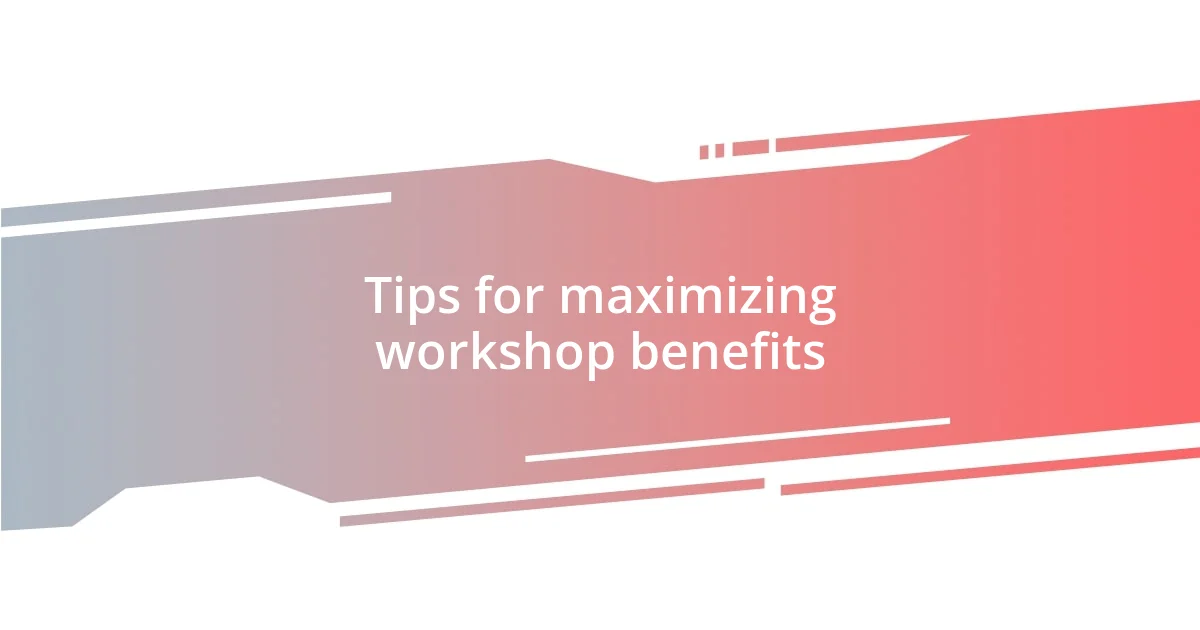
Tips for maximizing workshop benefits
To truly maximize the benefits of workshops, active engagement is key. I often find that merely attending isn’t enough; participating and pushing yourself out of your comfort zone makes a world of difference. For instance, during one session, I decided to volunteer for a demonstration despite my initial hesitation. Surprisingly, taking that leap opened the door to deeper connections and sparked vibrant discussions that I hadn’t anticipated.
Another tip is to approach every workshop with a curious mindset. It’s easy to fall into a passive role, especially if you’re surrounded by seasoned professionals. I remember feeling intimidated during a workshop filled with experts, yet I kept reminding myself that each person’s perspective carries value. By asking questions and sharing my thoughts, I not only learned more but also discovered innovative viewpoints that enriched my own creativity.
Lastly, don’t shy away from follow-up conversations after the workshop. Building a network of like-minded individuals can extend the benefits well beyond the event. After one particularly inspiring workshop, I reached out to fellow participants for coffee. Those informal meet-ups led to collaborative projects that I still cherish, demonstrating just how powerful those connections can be in nurturing ongoing inspiration. Have you ever considered how those post-workshop interactions could transform your creative journey?
